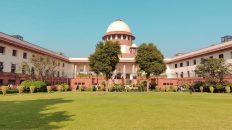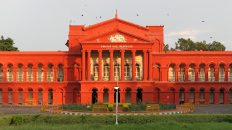The Supreme Court on 17th Feb.22, while setting aside the High Court order staying the Haryana government’s law reserving 75 per cent of private sector jobs for residents of the state, asked the HC to decide within four weeks, petitions challenging the validity of the legislation.
The top court also restrained the state government from taking any action against employers under the law during this time.
A Bench headed by Justice L Nageswara Rao set aside the February 3 interim order of the Punjab and Haryana High Court staying the “The Haryana State Employment of Local Candidates Act, 2020”, saying that the latter “has not given sufficient reasons for staying the legislation”.
The Bench, also comprising Justice P S Narasimha, said it did not want to enter into the merits of the matter and would leave it to the HC to take a call first.
Initially, Solicitor General Tushar Mehta, appearing for the state, told the apex court that four more states had similar legislations. The Bench then asked if it should transfer all of them to itself and hear the matter, or ask the HC to decide.
The SG replied that he will move for transferring the matters to the Supreme Court and urged the Bench to stay the HC order in the meantime.
The law, effective January 15, provides 75 per cent reservation in the private sector to job seekers who are “domiciled” in Haryana. Industry associations have challenged it on the ground that it will affect their businesses and make them less competitive.
However, the Bench added that it will then have to hear it on merits as the issue “is about livelihood and we are concerned about it”. “If you say it’s not a reasoned order, we can send it back for a reasoned order,” Justice Rao said.
The Supreme Court on 17th Feb.22, while setting aside the High Court order staying the Haryana government’s law reserving 75 per cent of private sector jobs for residents of the state, asked the HC to decide within four weeks, petitions challenging the validity of the legislation.
Appearing on behalf of a few associations which had challenged the law before the HC, Senior Advocate Dushyant Dave said he, too, can move a transfer application and said implementing it will lead to daily prosecutions.
“Is this the way the legislature can act? If this law is applicable for even a day, then there will be daily prosecutions. There are 9 lakh companies,” he submitted.
Intervening, Justice Narasimha said every state has its own legislation and the court was referring to the merits of it. “What we are on is how the HC immediately delivered an interim order,” he stated.
Dave added that even law firms will be affected following the enactment of the new law as it cannot employ juniors from other states unless they employ 75 per cent juniors from Haryana itself.
Senior Advocate Shyan Divan, who appeared for a few other associations, said it will have a profound impact on businesses.
He also urged the court to direct that there should be no coercive steps in case it decides that the stay should be vacated. “We don’t want penalties, offences and prosecution. This has profound constitutional implications on our federation,” Dave said.
The SG said that though there is a penalty provision for employers, it’s only after hearing the employee. However, the Bench said: “We are also taking into account the fact that there are thousands of people working there.”
The Haryana State Employment of Local Candidates Act, 2020, which came into force on January 15, provides 75 per cent reservation in the private sector to job seekers who are “domiciled in State of Haryana”. The law covers private companies, societies, trusts and partnership firms and applies to jobs that offer a maximum gross monthly salary or wages of up to Rs 30,000. Central or state governments, or any organisation owned by these governments are outside the ambit of the Act.
























Add comment